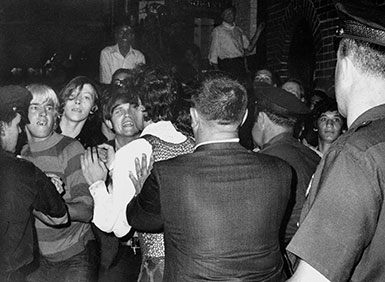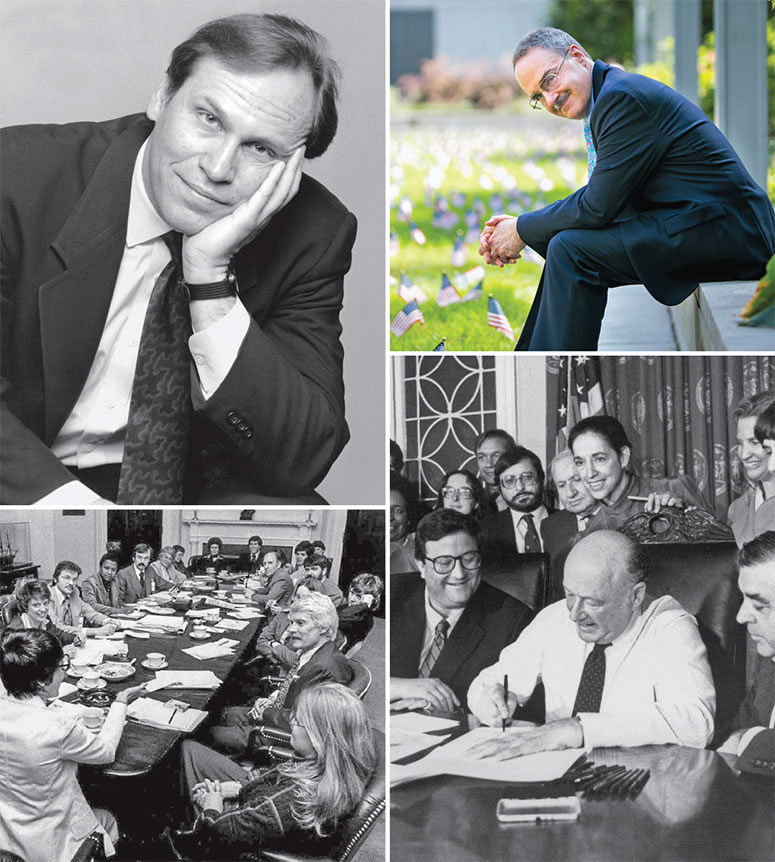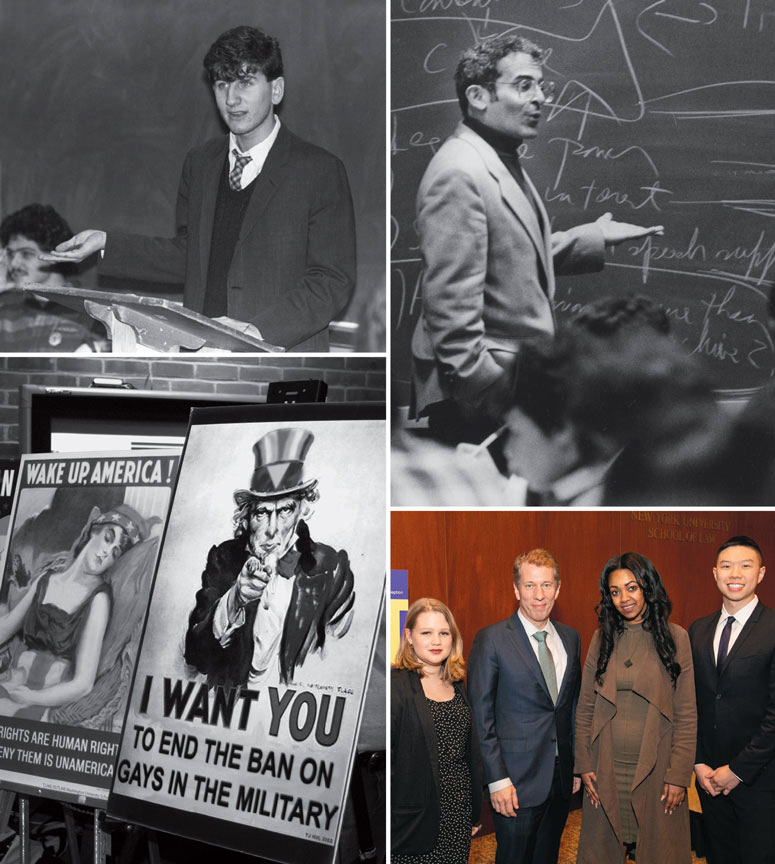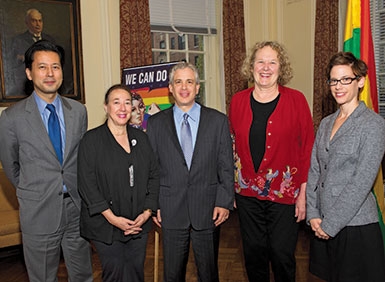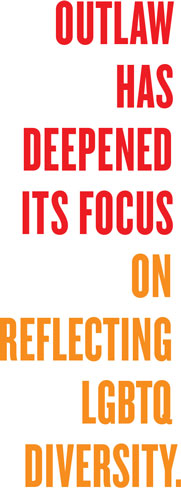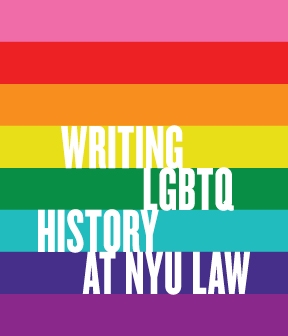Matters of Pride
In the 50 years since Stonewall, NYU Law students, faculty, and alumni have helped lead the movement for LGBTQ rights.
BY ATTICUS GANNAWAY
Well after midnight on June 28, 1969, Robert Spiegel ’77, at home in Queens, got a call from a Bronx High School of Science classmate. The police had raided the Stonewall Inn, a Mafia-run gay bar in Greenwich Village, and the patrons were fighting back. Seventeen-year-old Spiegel, a precocious activist who had come out to his parents at the age of 10, headed for the 7 train.
In an era when state laws penalized gay sexual activity and when coming out often resulted in social ostracism and job loss—not to mention physical violence—gay bars were a refuge for sexual minorities. When law enforcement roughly handled some drag queens that night while arresting them, customers and neighborhood residents threw objects at the police. The officers retreated inside Stonewall while those outside battered on the door and windows.
Spiegel arrived to find a crowd of hundreds milling around. “A lot of people were just in a daze; they couldn’t believe what had just happened,” he remembers. “And you did have some people holding hands and some people kissing, which was very unusual at that time.”
The Stonewall uprising was a watershed moment for the modern lesbian, gay, bisexual, transgender, and queer or questioning (LGBTQ) rights movement. In the aftermath, activists formed the Gay Liberation Front and the Gay Activists Alliance (GAA). Spiegel helped organize rallies and demonstrations, culminating in the inaugural Christopher Street Liberation Day March marking Stonewall’s anniversary. “The most significant thing about the march,” Spiegel says, “was having people first standing on the sidelines, and then more and more people joining us as we went down the street.” The annual event evolved into today’s NYC Pride March.
The law—and NYU School of Law, less than 600 yards from the Stonewall Inn—would need time to absorb the uprising’s ripple effects. The Commentator, then the Law School’s student newspaper, chronicled how students of the time were advocating for women’s equality, opposing the Vietnam War, and supporting civil rights for racial and ethnic minorities. On LGBTQ issues, there was largely silence. As the movement gained momentum, however, NYU Law would play a leading role in battles over sexual privacy, military service, and marriage. The Law School’s longtime activist streak was about to invigorate a new cause.
Taking the Lavender Leap
The first halting steps at NYU Law occurred shortly after Stonewall. In March 1970, Professor Norman Dorsen, director of NYU Law’s Arthur Garfield Hays Civil Liberties Program and then-general counsel of the American Civil Liberties Union (ACLU), filed Supreme Court certiorari petitions on behalf of two men to whom the government had denied top-secret security clearance because of same-sex sexual activity.
“We both knew it was a long shot,” recalls Hays Fellow Alan Sussman ’70, LLM ’01, who researched the medical and psychological literature on homosexuality. Dorsen, cognizant of the uphill struggle he faced, made a due process argument about the right to privacy rather than an equal protection claim. The Supreme Court denied both petitions.
Some alumni joined the cause early. Hal Weiner ’66 became GAA’s founding general counsel after representing the now-famous transgender activist Sylvia Rivera. “We had some very good cases,” Weiner says. When two GAA members were arrested for interrupting CBS anchorman Walter Cronkite during a live broadcast in 1973 to protest a lack of LGBTQ coverage, Weiner defended them in court.
Also that year, Dorsen’s former student Marilyn Haft ’68 founded the ACLU’s Sexual Privacy Project and began to seek constitutional test cases for gay rights. In 1977, working in the Carter administration, she helped arrange a meeting of gay and lesbian rights activists at the White House—the first gathering of its kind there. Haft characterizes the event as “earth-shattering.”
The same year, Edwin D. Webb Professor of Law David Richards joined the NYU Law faculty. For years he was the only publicly gay professor at the Law School. Richards wrote—and taught—about gay and lesbian rights when few other legal academics would. “I saw internally in my own love life that [anti-LGBTQ] laws were insane and inhuman and had no justification whatsoever,” he remembers. When Richards covered gay and lesbian rights in his early Constitutional Law classes, however, students would laugh. As the years passed, their reactions changed: “You could see that the development of the law was beginning to affect them, and they were taking the issues much more seriously.”
Daniel Pinello ’75 recalls that he tried to organize a gay and lesbian student group as a 1L, but only a few people showed up for the meetings. Pinello instead became deeply involved with an outside gay legal clinic, eventually taking it over. In April 1976, another attempt to start an LGBTQ student organization gained traction. Donald Hall ’78 and Linda Krieger ’78 co-founded Lesbian and Gay Law Students (LGLS), known today as OUTLaw. At first LGLS functioned mostly as a support and social organization, but when Chief Justice Warren Burger, viewed as an opponent of gay rights, visited NYU Law that spring, LGLS demonstrated outside Vanderbilt Hall with GAA and a University student group, the Gay People’s Union.
The Fight for Equality
One of the signatures in an open letter to Burger that appeared in the Commentator at the time belonged to Tom Stoddard ’77, the Hays Program’s first openly gay fellow. Mentored by Dorsen, Stoddard emerged as a key player in the LGBTQ movement. Equal parts legally strategic, media-savvy, and telegenic, Stoddard became executive director of the fledgling Lambda Legal Defense and Education Fund in 1986.
That year, he helped draft a New York City Council bill that banned sexual-orientation discrimination in employment, housing, and public accommodations. Mayor Ed Koch ’48, who signed the bill into law, later said of Stoddard, “He would find a way to explain, to placate and convince opponents that his approach was reasonable, rational, and one they could accept.”
But the trajectory of Stoddard’s six years with Lambda was determined largely by Bowers v. Hardwick (1986), in which the Supreme Court upheld the constitutionality of sodomy laws. Stoddard proclaimed Bowers “our Dred Scott case.” Giving his all to Lambda, he brought it national visibility and increased funding, growing the organization’s staff nearly fourfold.
At the same time, Stoddard taught a seminar, Sexuality and the Law, which the Law School began offering in 1981 at the suggestion of LGLS. Examining the law’s impact on gay men and lesbians, it was one of the first such courses in the country. Tom Kirdahy ’88 says it was his favorite class.
“He gave us a seat on the front lines of the LGBT judicial process,” Kirdahy says of Stoddard. “It was a gift.”
Throughout the 1980s, the rapidly evolving HIV/AIDS epidemic profoundly affected the LGBTQ movement—and Kirdahy. He joined the advocacy group AIDS Coalition to Unleash Power (ACT UP) in law school and created the first HIV project at Nassau Suffolk Law Services on Long Island in 1989. From there, Kirdahy worked as a staff attorney at Gay Men’s Health Crisis before becoming the director of Bronx AIDS Services.
By the time Tom Stoddard left Lambda in 1992, he had begun to disclose his HIV-positive status. He soon led an unsuccessful campaign against the military ban on gay men and lesbians. In 1993, although same-sex marriage was not yet legalized, Stoddard married Walter Rieman ’84. Stoddard had long recognized that barriers to marriage defined LGBTQ people as “other.” In a 1989 New York Times op-ed, he wrote that “those who wish to commit themselves to a relationship founded upon devotion should be encouraged, not scorned.”
The fight for marriage equality would last two more decades. The Supreme Court opinion Lawrence v. Texas (2003) paved the way by striking down sodomy laws nationwide. Current NYU Law Dean Trevor Morrison clerked for Justice Ruth Bader Ginsburg that term. “People were weeping in the courtroom,” recalls Morrison. “And I can remember, when I first read the draft opinion that circulated from the Kennedy chambers, it was very moving.”
NYU Law Life Trustee David Boies LLM ’67 and Theodore Olson, a former board member of the Law School’s Institute of Judicial Administration, won a Supreme Court victory that legalized same-sex marriage in California. The 2010 US District Court trial record in that case, Hollingsworth v. Perry, inspired Speak Now: Marriage Equality on Trial (2015) by Chief Justice Earl Warren Professor of Constitutional Law Kenji Yoshino, whose LGBTQ-related scholarship has been widely influential.
“The transcripts captured the best conversation I had seen on same-sex marriage—better than any legislative hearing, any academic debate, or any media exchange,” Yoshino writes.
Bans on same-sex marriage became unconstitutional nationally when the Supreme Court decided Obergefell v. Hodges (2015). While Stoddard did not live to witness that day, he had anticipated it decades before. “Tom understood that no one sees the whole narrative,” says Rieman. “History rolls along without everyone. And he did what he could on the issues that were presented to him during the time he had.”
Equal Opportunity
Early on, NYU Law stood against anti-LGBTQ employment discrimination. In 1978, at the request of LGLS, the faculty voted to prohibit recruiting by employers who discriminate on the basis of sexual orientation. Four years later, acting on a proposal from Law School Dean Norman Redlich LLM ’55, the University banned private employers who engaged in such discrimination. In 1988 student senators Kirdahy and Tom Hickey ’88 co-sponsored an amendment to extend that bar to non-military government employers; it passed with key support from Redlich.
Eight years later, Congress enacted the Solomon Amendment, which allows the US defense secretary to deny federal grants to universities that exclude military recruiters. NYU Law forfeited $75,000, but when the law was reinterpreted as applying to NYU as a whole, the University asked the Law School to admit the recruiters.
The Law School acquiesced—but not quietly. On October 16, 2000, about 100 students protested. Many signed up for interview slots; Richard McKewen ’01 wore a golden tiara and a black feather boa for his. And in September 2003, under the leadership of Dean Richard Revesz; Professors Sylvia Law ’68 and Burt Neuborne; and Associate Dean for Career Services Irene Dorzback, NYU Law signed on to a federal lawsuit challenging the Solomon Amendment. “What already had been done was so tremendous in terms of this institution taking a leading role,” Dorzback says. “Then when we signed on to FAIR v. Rumsfeld, that was another really proud moment.”
“It was a national effort that brought out the stories of discrimination against gay people in the military,” Law says of the suit. E. Joshua Rosenkranz, founding president of NYU Law’s Brennan Center for Justice, argued Forum for Academic and Institutional Rights, Inc. (FAIR) v. Rumsfeld (2006) before the Supreme Court, but the law school consortium met with defeat.
Student protests and NYU Law’s ameliorative measures continued until the military substantially ended its “Don’t ask, don’t tell” policy in 2011. More recently, however, the Law School has again updated its antidiscrimination policy to oppose the Trump administration’s rollback of the prior administration’s plan to allow transgender soldiers to serve openly.
Leading the March
Dean Trevor Morrison expresses pride in the Law School’s leadership on LGBTQ issues. “I want us to continue to be a thought leader in this area,” he says, listing a number of unsettled questions, such as how constitutional jurisprudence related to equal protection should address gender identity and transgender status.
LGBTQ rights continue to be a critical focus of David Richards’s prolific scholarship. Richards says that his interaction with University Professor Carol Gilligan, a frequent co-author, has given him deeper insight into the connections between LGBTQ rights and feminism.
Kenji Yoshino’s Covering: The Hidden Assault on Our Civil Rights (2006) analyzes the universal experience of “covering” certain parts of one’s identity. In his most recent research, Yoshino is looking at “trans-first jurisdictions,” or countries where certain transgender protections co-exist with the subjugation of women and persecution on the basis of sexual orientation. His working theory is that such states allow or even subsidize sex reassignment surgeries to eliminate gender ambiguity and the attendant threat to patriarchy.
Alumnus Daniel Pinello, who teaches at City University of New York’s John Jay College of Criminal Justice, has made his own scholarly contributions. Extensive empirical research yielded Gay Rights and American Law (2003), America’s Struggle for Same-Sex Marriage (2006), and America’s War on Same-Sex Couples and Their Families (2016).
LGBTQ scholars can also be activists. Pinello and his partner received court summonses in 2008 for refusing to leave the town hall in Oyster Bay, New York, without a marriage license.
Many other alumni have pursued LGBTQ activism in their careers. Between 1990 and 2008, Matt Foreman ’82 was executive director, successively, of the New York City Gay & Lesbian Anti-Violence Project, the Empire State Pride Agenda, and the National Gay and Lesbian Task Force. US Representative Diana DeGette ’82, a former vice-chair of the House Congressional LGBT Equality Caucus, co-sponsored the Equality Act of 2019—pending at press time—to amend the Civil Rights Act to include LGBTQ Americans. In her 15 years at Lambda, Hayley Gorenberg ’92 served as deputy director and general counsel. Leslie Cooper ’95 is deputy director of the ACLU’s LGBT & HIV Project, where Ria Tabacco Mar ’08 works as a senior staff attorney.
Alumni on the bench have upheld LGBTQ rights as well. While on the Massachusetts Supreme Judicial Court, John Greaney ’63 wrote a concurring opinion in the 2003 case making that state the first to legalize same-sex marriage. Judith Kaye ’62, the first woman to serve as chief judge of the New York Court of Appeals, dissented eloquently in Hernandez v. Robles (2006), whose majority opinion overturned a lower court decision in favor of same-sex marriage by Judge Doris Ling-Cohan ’79. Kaye advocated expanding rights in other significant LGBTQ and HIV/AIDS cases; an NYU Law scholarship named in Kaye’s memory supports students committed to LGBTQ rights work.
NYU Law’s LGBTQ student group, OUTLaw, inaugurated its annual award for LGBTQ alumni in 2013. This year, it honored Tsion Gurmu ’15, legal director of the Black Alliance for Just Immigration and founder of the Queer Black immigrant project. The 2018–19 co-chairs, Sean Chang ’20 and Elizabeth Lewis ’20, were intent on increasing the group’s inclusion efforts. “There’s been this hard push for more of a diversity focus and more focus on representing all of the perspectives of the LGBT+ community,” explains Lewis. Among the key issues, says Chang, are “violence against trans people of color specifically, or access to health care for trans people as well as trans representation generally.”
OUTLaw has worked closely with administrators on initiatives such as changing the admissions application to allow transgender and nonbinary applicants to self-identity more accurately. “Our question has become much more nuanced,” says Assistant Dean for Admissions Sandy Williams. Admissions does targeted outreach to LGBTQ-identifying applicants. Dean of Students and Assistant Dean for Diversity and Inclusion Lindsay Kendrick has also been working with OUTLaw. “I’m impressed with all the student energy and activism around LGBTQ issues,” she says. “We have to channel it and continue to keep pushing.”
The LGBTQ movement’s achievements have been hard-fought and significant. Today, Tom Kirdahy is a successful theater producer whose Broadway credits include Mothers and Sons (2014), written by his husband, Terrence McNally, which offered the first Broadway portrayal of a legally married gay couple, and Head Over Heels (2018), which featured the first transgender woman to originate a principal Broadway role. Kirdahy never forgets the sacrifices that have made LGBTQ visibility possible.
“In my soul,” he says, “I believe that we have not allowed people to die in vain, and all the enormous change that we’ve seen in our lifetime is a testament to all of those people we’ve lost.”
The legacy of Tom Stoddard embodies that testament. In October 1995, 16 months before his death, Stoddard addressed the crowd at a fundraiser for the Hays Fellowship named in his honor. He ended with a paraphrase of Ralph Waldo Emerson that would resonate with anyone who had ever felt alone, irreparable, or unloved. “I am defeated every day,” Stoddard said, “yet to victory I’m born.”
Video: “Stonewall 50,” created by NYU to observe the 50th anniversary of the Stonewall uprising, features commentary by Tom Kirdahy ’88 and Robert Spiegel ’77.
Senior Writer Atticus Gannaway is the author of a children’s novel.
Posted September 4, 2019


